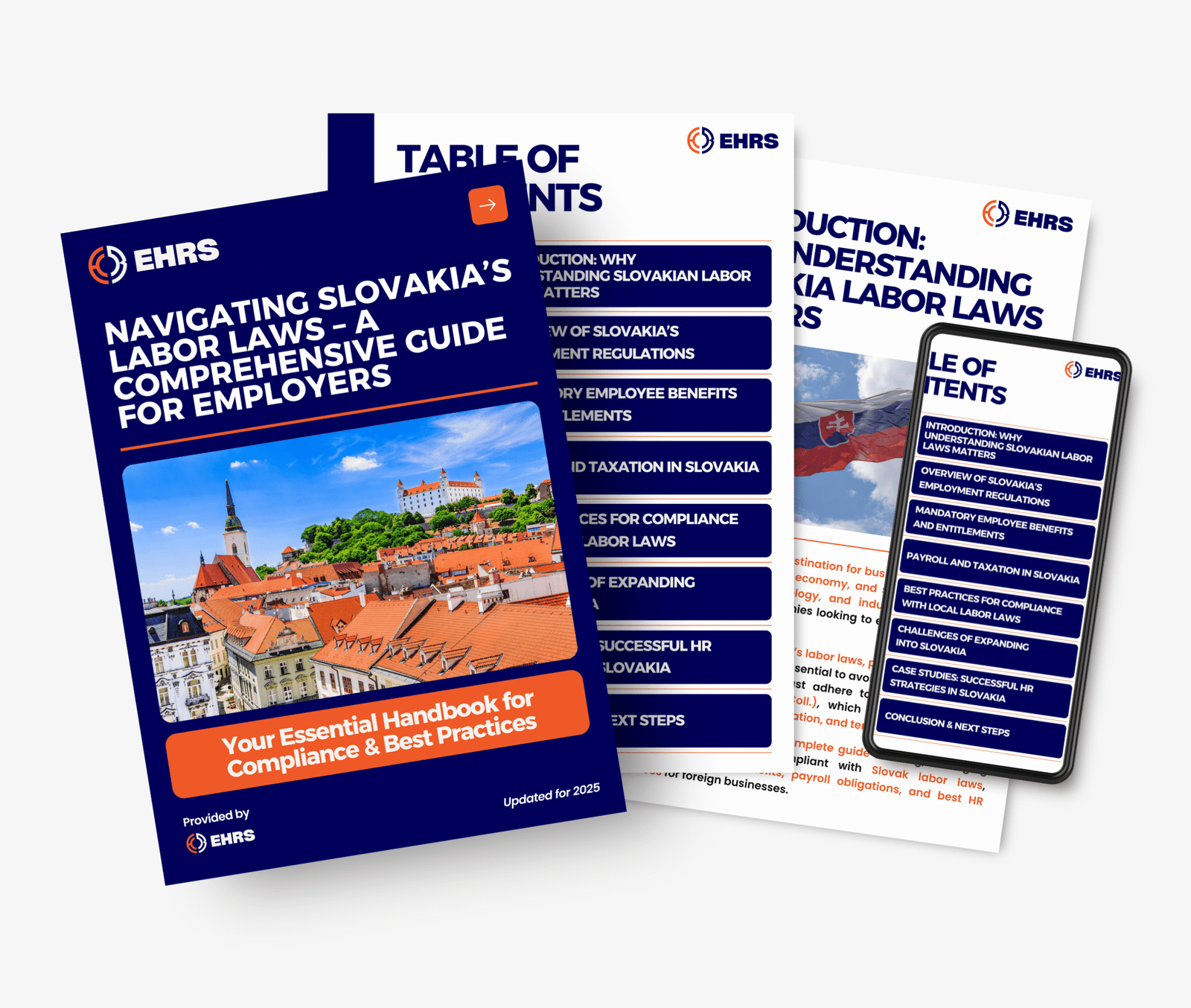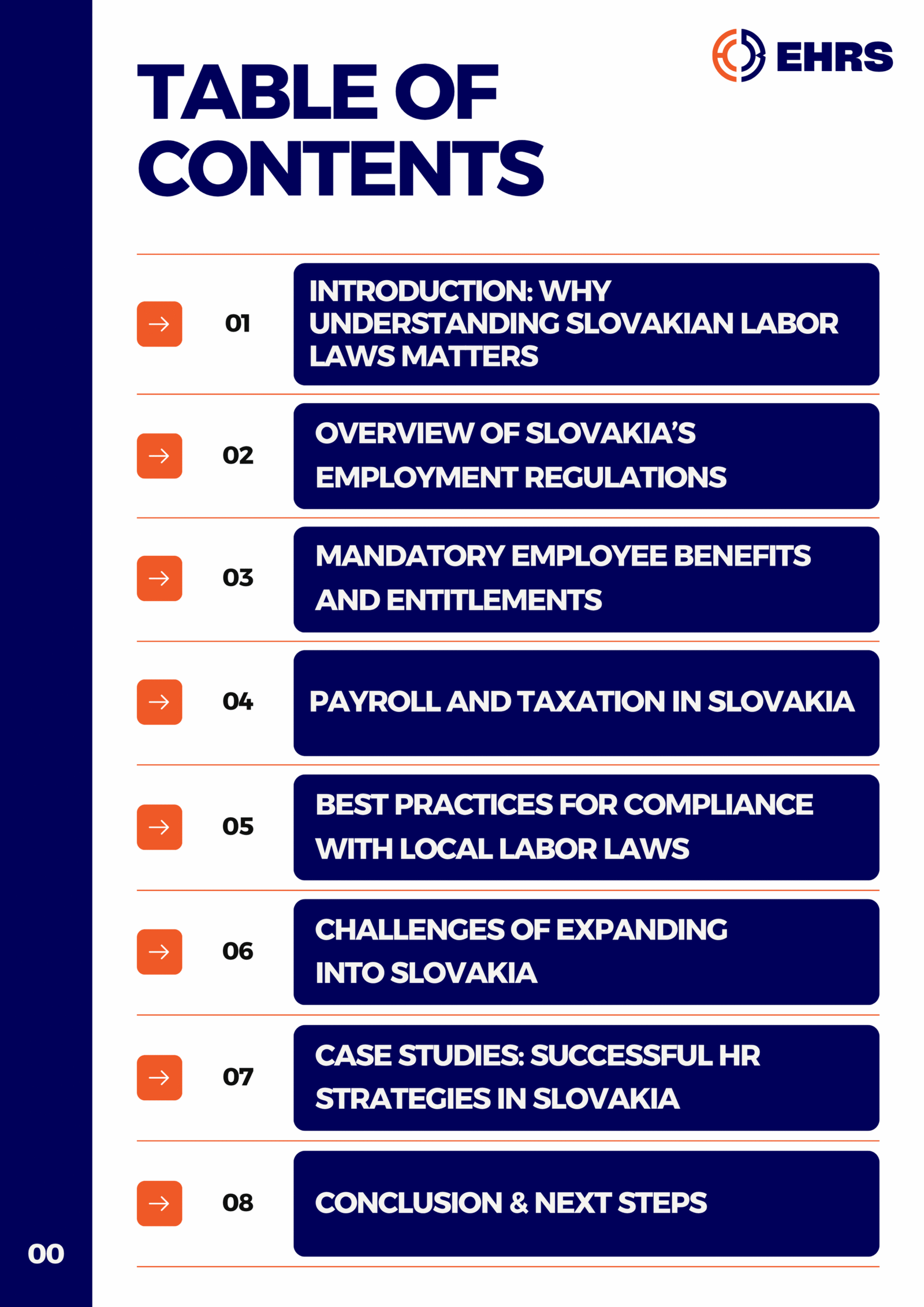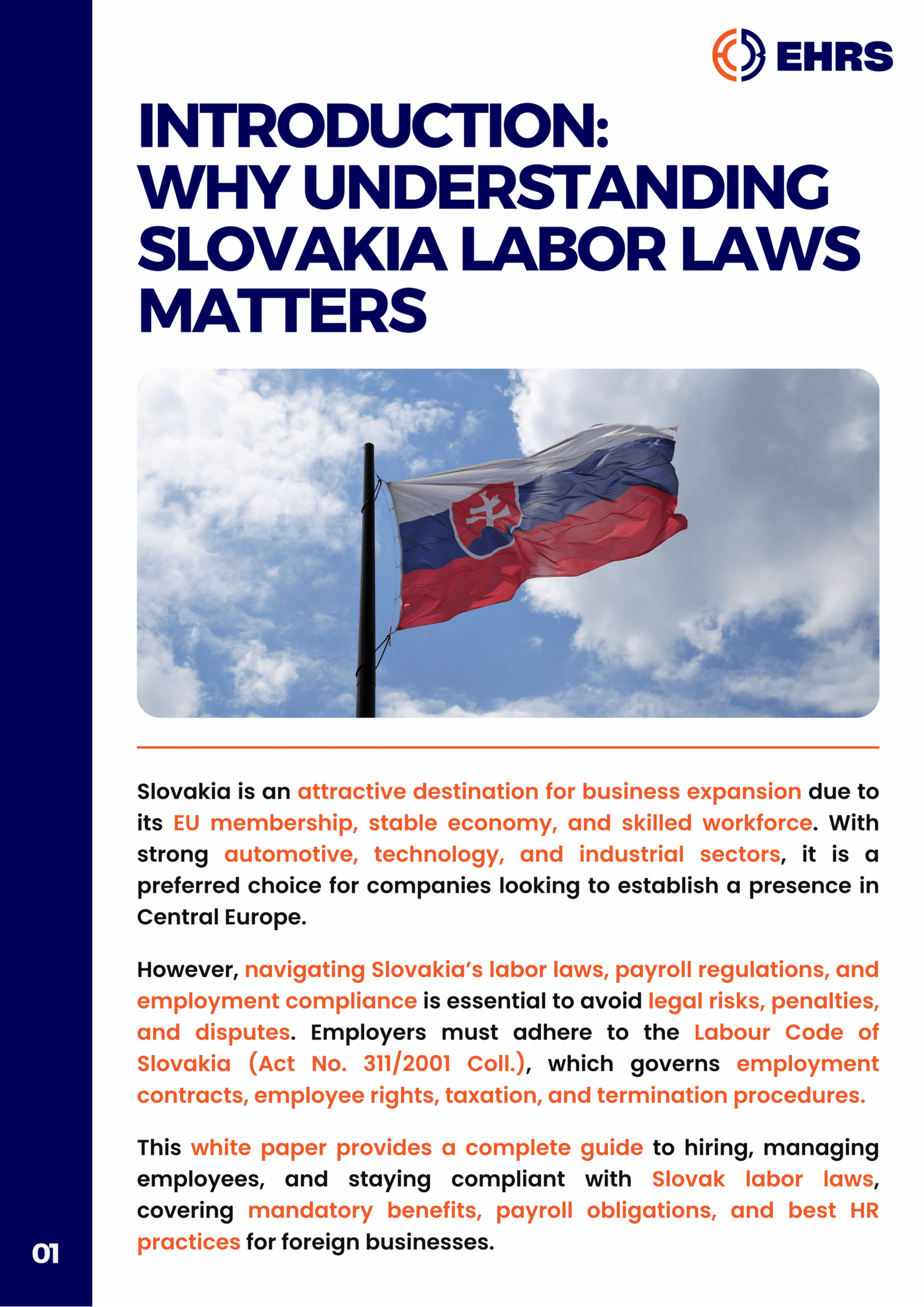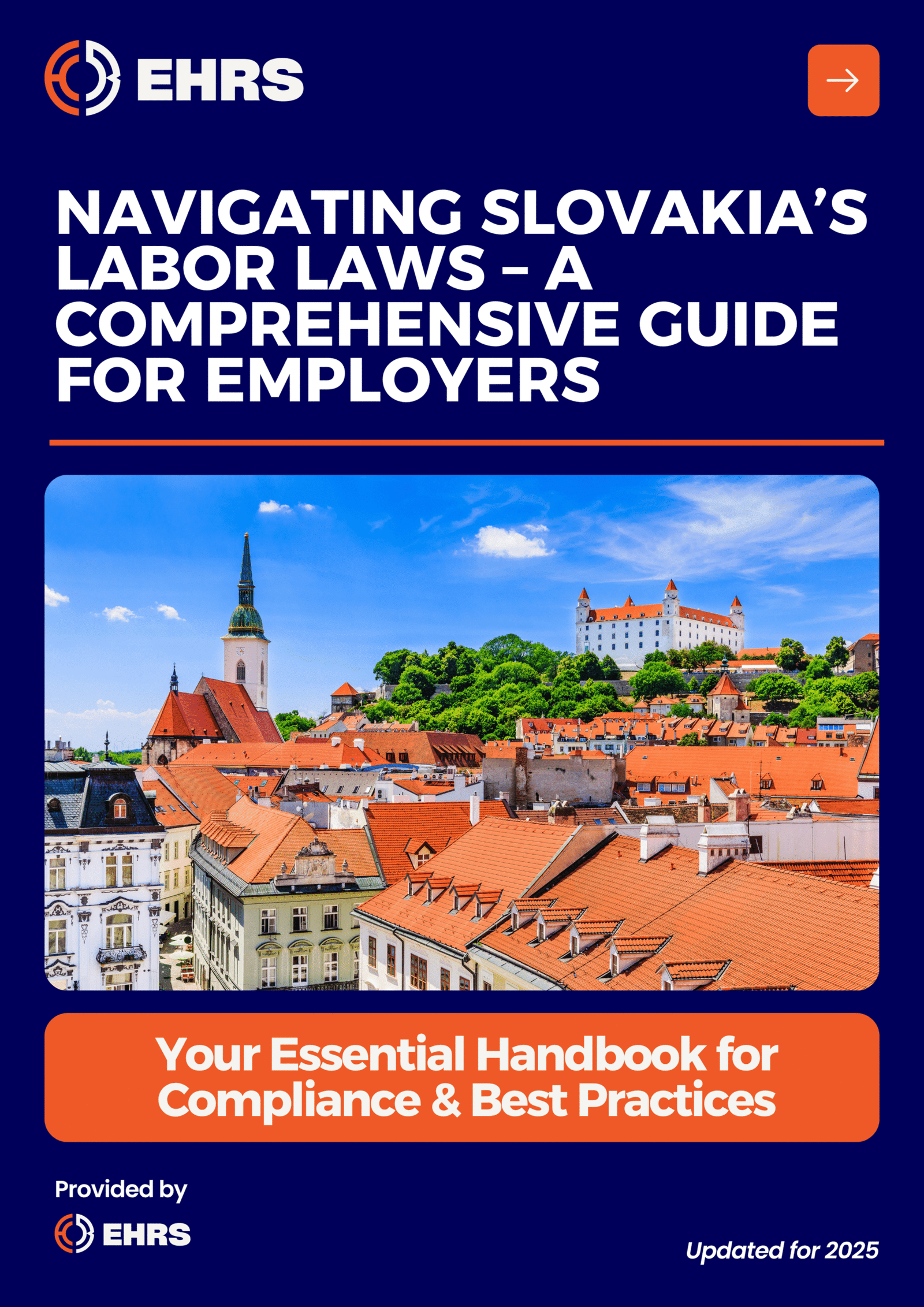SLOVAKIA
List of countries
HR Services for Slovakia
Europe HR Solutions delivers expert HR services for Slovakia, helping international companies manage payroll, contracts, compliance, and employee relations with ease. We simplify HR processes under Slovak labor law so your business can focus on growth and expansion.
According to the U.S. Department of State, Slovakia offers a stable, business-friendly environment in the heart of Central Europe. With strong industrial capacity, a skilled labor force, and full EU and Eurozone membership, Slovakia continues to attract U.S. and global investors in sectors such as automotive, electronics, and IT. The country benefits from sound legal protections, a transparent regulatory framework, and close economic ties to neighboring Germany, Austria, and the Czech Republic. U.S. companies play an important role in Slovakia’s economy, particularly in manufacturing and services.
However, HR operations in Slovakia can pose challenges for U.S. and UK companies unfamiliar with local labor law, payroll tax obligations, and digital reporting standards. Employment contracts must comply with Slovak labor code requirements, including precise clauses on salary, working hours, probation periods, and notice terms. Employers are also responsible for registering workers with health and social insurance systems and ensuring timely digital filings. Without local support, establishing a compliant HR setup can result in delays or penalties. By outsourcing HR to a trusted partner like EHRS, companies can streamline their market entry and ensure that contracts, payroll, and personnel records meet all Slovak and EU compliance requirements—efficiently and accurately from day one.
ALL YOU NEED TO KNOW ABOUT
HR OUTSOURCING IN SLOVAKIA
SLOVAK EMPLOYMENT
REGULATIONS TO KNOW
THE BENEFITS OF
EXPANSION IN SLOVAKIA
THE CHALLENGES OF
EXPANSION IN SLOVAKIA

Check our free HR guide to help you quickly improve your HR in Slovakia
FAQ for Slovakia
Learn more about Slovakia
Free Download
Request your free guide and receive it immediately

All You Need to Know About Outsourcing
Your HR in Slovakia with EHRS
Comprehensive HR Outsourcing Support
EHRS provides full-service HR services for Slovakia, managing everything from employment contracts and payroll to onboarding, leave management, and legal compliance. Our local HR experts ensure your operations are compliant, efficient, and built for sustainable growth.
Expert Navigation of Slovak Labor Law
Slovak labor law is detailed and strictly regulated, with clear rules around employment types, working time, probation, severance, and tax obligations. EHRS helps your company remain compliant with national labor codes and EU directives, avoiding costly mistakes and delays.
Scalable and Efficient HR Solutions
Whether you’re expanding into Bratislava, Košice, or managing cross-border teams, EHRS offers flexible HR solutions that scale with your business. We support both SMEs and multinational corporations seeking regulatory confidence and HR efficiency.
Slovak Employment Regulations to Know
Employment Contracts
In Slovakia, all employment relationships must be formalized with a written contract signed before the employee begins work. Contracts must specify key terms, including job title, place of work, salary, weekly working hours, and length of employment (if fixed-term). With our HR services for Slovakia, you can be confident every agreement meets national labor requirements.
Working Hours & Paid Leave
The standard workweek in Slovakia is 40 hours. Employees are entitled to at least 4 weeks of paid annual leave (5 weeks for employees over age 33). Overtime, night work, and rest periods are regulated under the Slovak Labour Code.
Social Insurance & Tax Contributions
Employers must register employees with the Slovak Social Insurance Agency and Health Insurance Company. Monthly contributions must be made to cover pensions, health insurance, unemployment benefits, and sickness coverage. Accurate digital reporting is required via the eGov portal.
The Benefits of Expansion in Slovakia
Central EU Location & Market Access
Slovakia offers access to key Central European markets, sharing borders with Austria, Hungary, Poland, and the Czech Republic. It’s a logistics-friendly base with robust infrastructure and road networks across the EU.
Educated, Cost-Competitive Workforce
Slovakia has a strong tradition in manufacturing, automotive, engineering, and IT. The labor force is skilled and relatively cost-effective compared to Western Europe, making it ideal for shared service centers and production sites.
Business-Friendly Environment
Slovakia offers an investor-friendly climate with EU-backed incentives, tax benefits, and digital government systems that support foreign company setup and HR registration.
The Challenges of Expansion in Slovakia
Detailed Employment Law and Documentation
Slovak labor law is highly codified, with specific rules around terminations, trial periods, salary structures, and working time flexibility. Mistakes in contracts or dismissals can lead to fines or labor disputes.
Language & Legal Formalities
All employment contracts and labor filings must be completed in Slovak. Legal translation and local HR guidance are essential to ensure compliance and employee clarity.
Administrative Burden
Although digital processes are improving, Slovakia still has complex registration requirements with multiple government bodies. Navigating payroll submissions, social insurance, and labor inspections requires close coordination with local experts.
Talk to an HR specialist about payroll, compliance, and audits today.
Expand into Slovakia with confidence.
Most Asked Questions
About Slovakia
Why do I need a written employment contract in Slovakia? Aren’t verbal agreements valid?
Written employment contracts are mandatory under Slovak labor law. They must specify key terms like salary, job duties, and working hours. Verbal agreements are not legally recognized, and their absence could lead to disputes or fines.
Why It’s Risk-Free: We draft fully compliant employment contracts, ensuring clarity and protecting your business from legal challenges
Do I really need to track working hours in Slovakia? Isn’t flexibility more practical?
Slovak labor law requires employers to track working hours to ensure compliance with the standard 40-hour workweek. Accurate records also protect against disputes over overtime or rest periods.
Why It’s Risk-Free: We implement efficient time-tracking systems, ensuring compliance while supporting workplace flexibility.
How much annual leave do I need to provide? Isn’t the statutory minimum sufficient?
Employees in Slovakia are entitled to a minimum of 20 working days of annual leave, increasing to 25 days for employees over 33 years old. Offering only the minimum might harm retention and morale.
Why It’s Risk-Free: We create leave policies that comply with regulations while remaining competitive in the job market.
Parental leave in Slovakia seems long. How can I maintain productivity during employee absences?
Slovak labor law allows parents up to 3 years of parental leave, paid by social insurance. Workforce planning and temporary hires can help maintain productivity.
Why It’s Risk-Free: We assist with leave planning and compliance, ensuring operational stability while supporting employee needs.
Are collective agreements (CAs) mandatory in Slovakia? Can’t I create my own policies?
CAs are not mandatory but are common in certain industries. They regulate wages, benefits, and working conditions. Ignoring applicable agreements can lead to disputes.
Why It’s Risk-Free: We evaluate whether CAs apply to your business and align your policies with Slovak labor standards.
How do payroll taxes work in Slovakia? What happens if I make a mistake?
Employers are responsible for deducting income tax, social insurance, and health contributions from salaries. Errors can lead to audits or penalties.
Why It’s Risk-Free: We manage payroll compliance, ensuring accurate deductions and timely filings with Slovak authorities.
Do I need to focus on health and safety in Slovakia? Isn’t this just common sense?
Employers in Slovakia are required to implement health and safety measures, including regular risk assessments and training. Non-compliance can lead to fines or workplace accidents.
Why It’s Risk-Free: We provide comprehensive health and safety solutions, ensuring compliance and protecting your workforce.
Is compliance worth the cost? Won’t it just increase my overheads?
The cost of non-compliance—fines, lawsuits, and employee turnover—far outweighs the investment in proactive compliance. It also enhances trust and operational stability.
Why It’s Risk-Free: We streamline compliance processes, saving you time and money while ensuring your business operates efficiently and legally.
Are probation periods necessary? Can’t I just terminate employees who don’t perform?
Probation periods in Slovakia, typically capped at 3 months (6 months for managerial roles), allow for termination without notice during this period. Without a probation clause, terminations must follow stricter rules.
Why It’s Risk-Free: We create probation agreements that comply with Slovak labor law, providing flexibility while reducing termination risks.
Is overtime pay mandatory? Can’t I just offer time off instead?
Overtime in Slovakia must be compensated with a 25% pay premium or substituted with time off if agreed upon. Overtime must not exceed 150 hours annually unless otherwise permitted.
Why It’s Risk-Free: We help you develop compliant overtime policies, ensuring fairness and avoiding costly disputes.
Do I need to pay employees during sick leave? Isn’t this covered by social insurance?
Employers must pay sick leave for the first 10 days, at 25% of the employee’s average daily earnings for days 1-3 and 55% for days 4-10. After that, social insurance takes over.
Why It’s Risk-Free: We manage sick leave processes and filings, ensuring compliance and minimizing administrative overhead.
Termination laws in Slovakia sound restrictive. What if I need to reduce staff quickly?
Terminations must comply with Slovak labor law, which includes valid reasons, notice periods, and severance pay in some cases. Non-compliance can result in legal claims or fines.
Why It’s Risk-Free: We guide you through lawful termination processes, protecting your business while ensuring compliance.
Are pensions mandatory in Slovakia? Isn’t salary enough to retain employees?
Employers must contribute to Slovakia’s mandatory pension system through social insurance. Offering additional private pensions can help retain employees and improve loyalty.
Why It’s Risk-Free: We ensure compliance with pension contributions and help design competitive benefit packages.
Can I hire non-EU workers in Slovakia? Isn’t the process too complicated?
Non-EU workers require a work and residence permit. Employers must demonstrate that no local or EU candidate can fill the position. Errors or delays can disrupt hiring timelines.
Why It’s Risk-Free: We handle the permit application process, ensuring compliance and a smooth onboarding experience for international hires.
What happens if I fail a compliance audit in Slovakia? Could it disrupt my operations?
Non-compliance with Slovak labor laws can result in fines, legal claims, or operational restrictions. Audits often focus on contracts, payroll, and workplace safety measures.
Why It’s Risk-Free: We proactively review your HR policies and practices, ensuring compliance and audit readiness to keep your business running smoothly.



